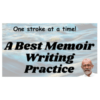Here’s Why You Should Read
The Memoir Writer’s Blog!
Perhaps you are not yet on a writing jag. It is early morning (or at least it is time for you to write so you are early in your writing for the day). You turn your computer on, sip your coffee or tea, wonder about your day and about what you might write. You could use a bit of writing motivation. You know you are going to write a portion of your memoir—or perhaps it is a memoir you are writing of one of your parents or of your spouse. Soon your RSS feed informs you there is a new post from The Memoir Writer’s Blog. You are not quite ready to start writing so you dawdle a bit and read the post. It is about technique—perhaps on beginning a section or perhaps about creating vivid character. Well, it makes sense and you decide to implement the suggestion. Or…
Perhaps you are feeling overwhelmed. You have been at this writing so long! Is it really worth continuing? You begin reading the day’s post and it is a piece of memoir, the piece about when my mother’s aunt left to go back to Canada and suddenly you realize how much you want to tell the story of your aunt who died when you were twelve and how you loved her and you begin to write that. It is out of sequence but you know you can connect it later to the rest of the story. Or perhaps, before you sit down to write, you turn to more of the stories of my mother—and are pleased to find so many excerpts from her memoir. You want to see how I have handled her story or perhaps simply to live for a while in another era before you begin to write about your aunt. Or…
Perhaps you have been questioning whether you have enough skill in presenting action effectively and you turn to the categories of the blog and, sure enough, you find there a category labeled “action” under technique and you click on it. You discover several articles on how to create more effective action. In fact, you are reminded that action is not synonymous with “interesting” but that action like character and setting has to be better crafted. Or…
Perhaps it is not motivation or craft that is stopping you but the process itself. You have been having trouble with the pre-writing function and you check the blog categories and find several excellent articles on pre-writing and, before you do anything today, you read (or re-read) these articles on The Memoir Writer’s Blog. They ground you, and you move on to the writing you wish to accomplish today.
It is now clear to you that this blog, The Memoir Writer’s Blog, is an effective tool for you to learn to be a much better memoir writer. You turn to your spouse (or perhaps you are speaking to yourself) and say, “I’m getting a writing education from The Memoir Network’s blog. That’s why I turn to it whenever I commence to write.”
Then you forward a link to The Memoir Writer’s Blog to someone who is writing. You know the post you are alerting your friend to will have the same effect on him/her as it had on you.
So that’s how I hope you read The Memoir Writer’s Blog—as a way to create a context for you to delve into your memoir on a given day—today perhaps. Any one of the many posts can serve you as an entry point into the day’s creation.
What you’ll get
1. Regular, even daily, inspiration and motivation to write.
2. Education in both craft and process that will permit you to write the best memoir you are capable of.
I hope you won’t do this.
You can, of course, read The Memoir Writer’s Blog for entertainment, as a way of making a diversion for yourself so you don’t have to do the work that is the focus of The Memoir Writer’s Blog, but I hope you won’t do this.
We publish posts regularly on a variety of topics in The Memoir Writer’s Blog. Keep coming and keep checking the categories and tags for topics that will help you to succeed. Subscribe via the FOLLOW at the bottom right of the page where you find this entry. You will receive a notice of every new post.
In conclusion
Keep writing. Let this be the year you write and publish your memoir.
__________










